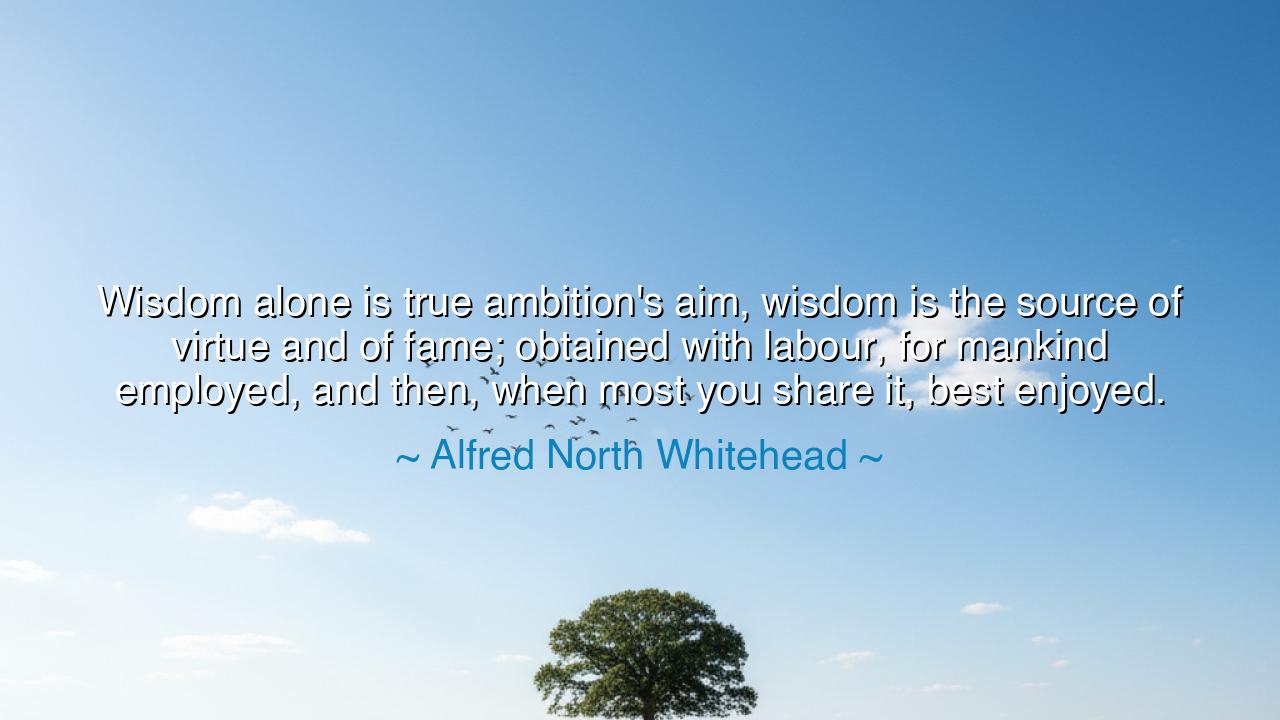
Wisdom alone is true ambition's aim, wisdom is the source of
Wisdom alone is true ambition's aim, wisdom is the source of virtue and of fame; obtained with labour, for mankind employed, and then, when most you share it, best enjoyed.






Hearken, children of distant ages, to the exalted words of Alfred North Whitehead, who proclaimed: “Wisdom alone is true ambition's aim, wisdom is the source of virtue and of fame; obtained with labour, for mankind employed, and then, when most you share it, best enjoyed.” In this utterance lies the eternal truth of the human spirit: that ambition finds its noblest form not in wealth, power, or fleeting glory, but in the pursuit of wisdom, that radiant light which illuminates the path of virtue and enduring renown.
Whitehead teaches that wisdom is both source and reward. It cultivates virtue, guiding the soul to act rightly, and it brings fame—not the hollow echo of vanity, but the reverent recognition of those who perceive true merit. Yet this wisdom is not granted freely; it is forged through labor, tempered by study, reflection, and the application of intellect in service to the world. Only those who toil diligently can drink deeply from its well.
Consider the life of Socrates, who, through relentless inquiry and dialogue, sought wisdom above all else. His pursuit was marked not by desire for wealth or authority, but by devotion to truth and the cultivation of virtue in himself and others. And though he faced scorn and ultimately death, his teachings endured, a luminous testament to the idea that wisdom, obtained through labor and shared generously, achieves the highest form of enjoyment and legacy.
Whitehead further extols the principle that wisdom increases in value when shared. Knowledge hoarded is diminished; insight entrusted to others multiplies in significance. The act of teaching, mentoring, and guiding others is not a sacrifice, but the culmination of the joy of wisdom. As the ancients observed, the true measure of intellect is in its service to mankind, in the cultivation of understanding that lifts others and enriches the collective soul.
Thus, his words are both exhortation and counsel: let ambition seek the sublime prize of wisdom, embrace the toil required to attain it, and dedicate that treasure to the betterment of humanity. In this way, virtue, renown, and enduring joy are intertwined, each reinforcing the other. The labor of the mind becomes the inheritance of civilization, a beacon for generations yet to come.
Carry this teaching, children of ages yet unborn: pursue wisdom with steadfast labor, cultivate virtue through deliberate action, and share generously what you have learned. In this sacred cycle lies the true delight of life—the joy of knowing, the honor of acting rightly, and the enduring pleasure of wisdom shared, admired, and lived by all.






TLTa Thi Lam
I find this quote both inspiring and humbling. It suggests that the truest form of ambition isn’t about personal advancement but about enlightenment and contribution. The last line especially stands out—‘when most you share it, best enjoyed.’ It makes me think about how knowledge hoarded becomes sterile, but wisdom given away becomes alive. Maybe that’s what separates mere cleverness from true wisdom.
TNtrang nguyen
There’s something timeless about this message. It suggests that ambition, when purified by wisdom, transforms from ego-driven desire into a force for good. But it makes me question how we define ‘labour’ in this context. Is he referring to intellectual effort, moral struggle, or both? It seems that wisdom isn’t a passive gift—it’s earned through reflection, experience, and self-discipline. That gives ambition a nobler shape.
TALe thi anh
What strikes me most here is the idea that wisdom is only fully realized when shared. It challenges the notion of knowledge as personal power. I wonder—does this mean that isolation actually limits true understanding? It’s like he’s saying wisdom grows through generosity, not accumulation. Maybe the joy he mentions comes from the sense of connection that comes when knowledge benefits others.
HAHoai An
I really like how this line connects wisdom, virtue, and joy—it’s almost poetic in how it ties together purpose and morality. But I’m curious, does wisdom always lead to virtue? Some people gain great knowledge yet use it destructively. Maybe Whitehead means that wisdom isn’t just intellect, but insight guided by empathy. It’s a beautiful ideal, though one that feels hard to live by in today’s world.
TThao
This quote feels like a refreshing reminder that ambition doesn’t have to be selfish. Whitehead seems to redefine success as something rooted in wisdom and service to others. It makes me wonder—how different would society look if ambition were measured not by wealth or status, but by the depth of understanding we gain and the good we do with it? True ambition, in this sense, feels almost spiritual.